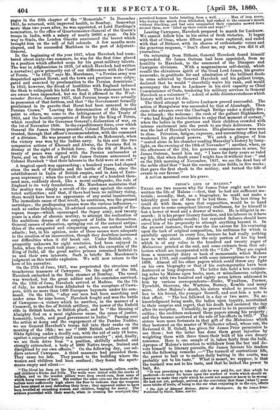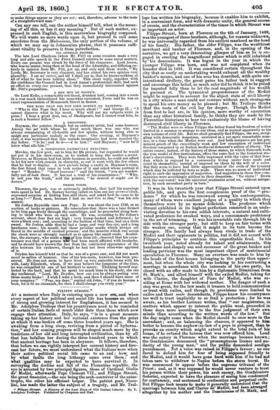PRIOR'S LIFE OF MALONE..
TirERE are two reasons why Sir James Prior ought not to have written the life of Malone :—first, that he had not sufficient ma- terials ; secondly, that, as a biographer, he could not make a tolerably good use of them if he had them. The best thing he Could do with them, upon that supposition, would be to hand them over to some competent literary craftsman, for he himself is cbut a hewer of wood and a drawer of water. He is diligent in re- search ; it is his proper literary function, and his labours in it have often yielded valuable results ; but repeated failures should have cured him of his propensity to attempt anything beyond it. In the present instance, there was the less excuse for his venturing upon the task of original composition, his unfitness for whioh is painfully apparent in every line, because he had really nothing new to write about. Almost the only portion of his big book which is of any value is the hundred and twenty pages of Maloniana printed at the end, and some extracts from that col- lection which are incorporated with the "Life." They are copied from a manuscript• diary or book of memoranda which Malone began in 1783, and continued with some interruptions to the year 1808. Almost all his other papers which could. throw any light on his own biography or that of his contemporaries have been destroyed or long dispersed. The latter fate befel a box contain- ing notes by Malone upon books, men, or miscellaneous subjects, together with two hundred and eighty seven letters addressed to him by various correspondents—Burke, Wyndham, Farmer, Tyrwhitt, Steevens, the Wartons, Burney, Kemble and many more. After Malone's death, his sisters wished to present this box to his friend, the younger Boswell, and sent him a note to that effect. " The box followed in a day or two more. No ac- knowledgment being made, the ladies upon inquiry, ascertained to their surprise and regret, that his death had occurred, the day after its reception. Unluckily, be proved to be in pecuniary diffi- culties ; the creditors reckoned these paperi among his property ; and they became scattered at the sale of his effects in 1825." The sisters were more fortunate in that gift of the Maloniana which they bestowed on the master of Winchester school, whose son, the Reverend G. H. Gabell, has given Sir James Prior permission to use them ; but the latter has done them great injustice by weighting them with three times their bulk of his own dreary nonsense. Here is one sample of it, taken fairly from the bulk. Apropos of Malone's intention to withdraw from the bar and de- vote himself to literary pursuits, Sir James favours his readers with the following remarks .—" The turmoil of contentious life, the power to bait or to endure daily baiting in the courts, was probably not to his taste." What is meant, we suppose, is that the turmoil was not to his taste, and that he lacked the power to bait, &o. "It was provoking to take the side he was paid. for, not that which he preferred—to enter for hours upon the warfare of words which should en deavour to make that right which he could not suspect or know to be wrong He had not yet, perhaps, arrived at the conviction that those [(what ?) were mere tricks of trade, of being to the ear what conjuring is to the eye, efforts • The Life of Edmond Malone, Editor of Shakspeare. By Sir James Prior. Published by Smith, Elder, and Co. to make things appear as they are not; and, therefore, adverse to the taste of a straightforward man."
Can any one tell, can the author himself tell, what is the mean- ing of all this, or has it any meaning ? But of such matter, ex- pressed in such English, is this marrowless biography composed. We will waste no more words upon it, but proceed to cull some anecdotes from the Maloniana, the only portion of the volume, of which we may say in Johnsonian phrase, that it possesses suffi- cient vitality to preserve it from putrefaction.
PIS CONSILII EXPERS.
The late Lord Chatham (when Mr. Pitt) on some occasion made a very long and able speech in the Privy Council relative to some naval matters. Every one present was struck by the force of his eloquence. Lord Anson, who was no orator, being then at the head of the Admiralty, and differing en- tirely in opinion from Mr. Pitt, got up, and only said these words, "My Lords, Mr. Secretary is very eloquent, and has stated his own opinion very plausibly. I am no orator, and all I shall say is, that he knows nothing at all of what he has been talking about." This short reply, together with i the confidence the Council had in Lord Anson's professional skill, had such an effect on every one present, that they immediately determined against Mr. Pitt's proposition.
A BON MOT OP FOOTE'S.
On Lord Kelly, a remarkably red-faced, drunken lord, coming into a room in a coat much embroidered but somewhat tarnished, Foote said he was an exact representation of Monmouth Street in flames.
THE KING THAT DID NOT LIKE EOETRY OE BALNTING.
"'Who is this Pope that I hear so much about ? " said George II.; "I cannot discover what is his merit. Why will not my subjects write in prose ? I hear a great deal, too, of Shakspeare, but I cannot read him, he is such a bombast fellow."
A DISCOVERY.
Hayman, the painter, though but an ordinary artist, had some humour. Among the set with whom he lived much there was one who was always complaining of ill-health and low spirits, without being able to assign any particular malady as the cause. One evening, at Hayman's club, it was mentioned that this malade imaginaire had been married the day before. "Is he ! and be d—d to him !" said Hayman ; "now he'll know what ails him !"
A COMMISSION FAITHFULLY EXECUTED.
Mendez, the Jew poet, sat to him for his picture, but requested he would not put it in his show-room, as he wished to keep the matter a secret. However, as Hayman had but little business in portraits, he could not afford to let his new work remain in obscurity, so out it went with the few others that he had to display. A new picture being a rarity in Hayman's room, the first friend that came in took notice of it and asked whose portrait it was ? " Mendez." " Good heavens !" said the friend, " you are wonder- fully out of luck there. It has not a trait of his countenance." " Why, to tell you the truth," said the painter, " he desired it might not be known."
THREE POETS.
Thomson, the poet, was so extremely indolent, that half his mornings were spent in bed. Dr. Burney having called on him one day at two o'clock, expressed surprise at finding him still there, and asked how he came to lie so long ?—" Ecod, mon, because I had no mot-tire to rise," was his sole answer.
Sir Joshua Reynolds once saw Pope. It was about the year 1740, at an auction of books or pictures. He remembers that there was a lane formed to let him piss freely through the assemblage, and he proceeded along bow- ing to those who were on each side. He was, according to Sir Johua's account, about four feet six high ; very hump-backed and deformed ; he wore a black coat; and, according to the fashion of that time, had on a little sword. Sir Joshua adds that he had a large and very fine eve, and a long handsome nose; his mouth had those peculiar marks which always are found in the mouths of crooked persons ; and the muscles which run across the cheek were so strongly marked as to appear like small cords. Roubil- liac, the statuary, who made a Wolof him from life, observed that his coun- tenance was that of a person w16 had been much afflicted with headache, and he should have known the fact from the contracted appearance of the skin between his eyebrows, though he had not been otherwise apprised of it.
Dryden has himself told us that he was of a grave cast, and did not much excel in sallies of humour. One of his bon-mots, however, has been pre- served. He does not seem to have lived on very amicable terms with his wife, Lady Elizabeth, whom, if we may believe the lampoons of the time, he was compelled by one of her brothers to marry. Thinking herself neg- lected by the bard, and that he spent too much time in his study, she one day exclaimed, " Lord, Mr. Dryden, how can you be always poring over those musty books ; I wish I were a liook, and then I should have more of your company." "Pray, my dear," replied old John, " if you do become a book, let it be an almanack, for then I shall change you every year."



























 Previous page
Previous page